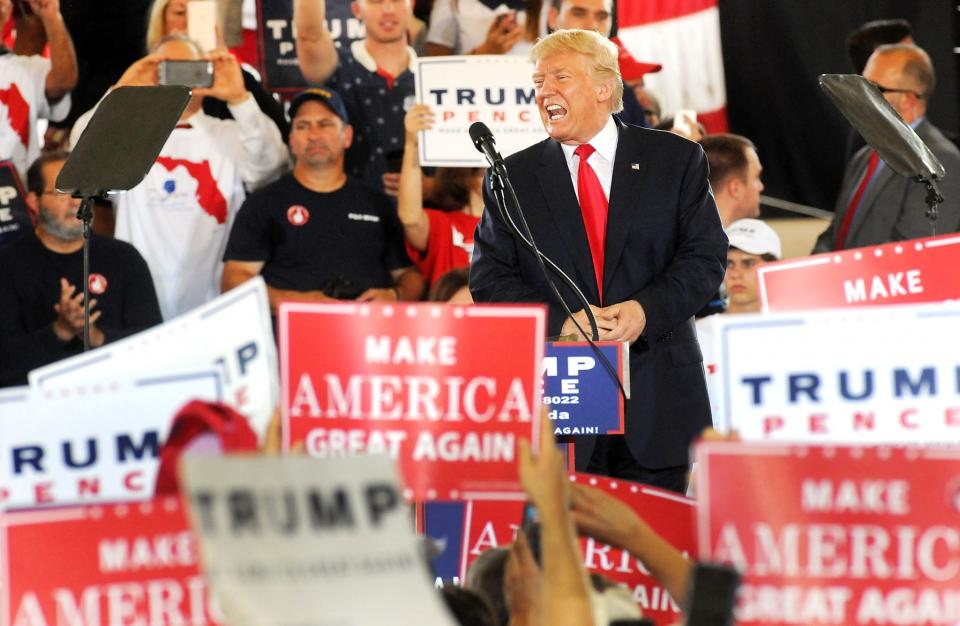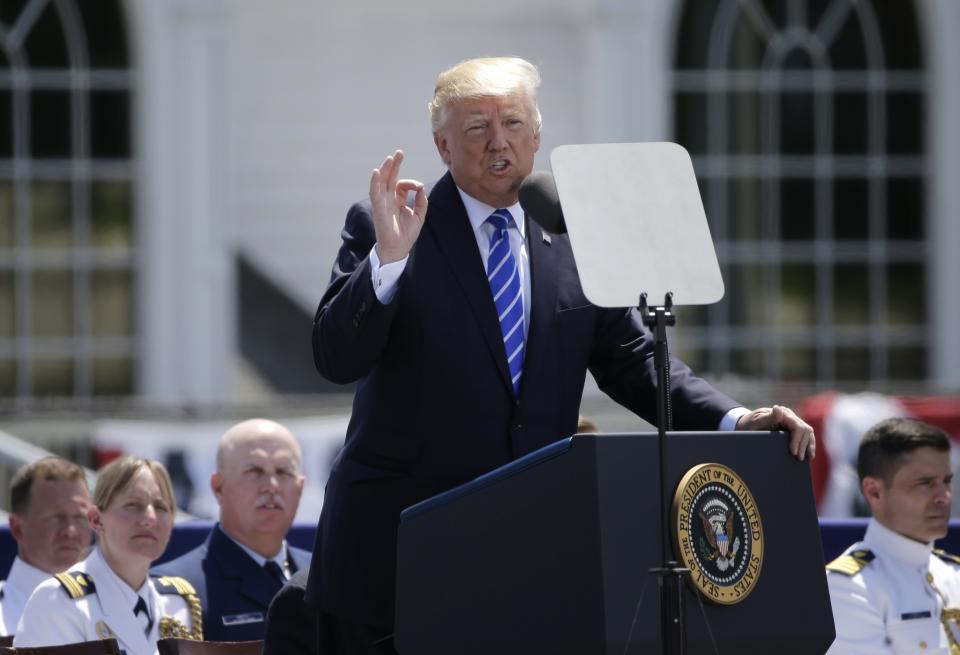Trump to address Muslim leaders. But will he say ‘radical Islamic terrorism’?
WASHINGTON — As President Trump embarks on his astonishingly ambitious first foreign trip, he faces an intriguing test of rhetorical resolve: Will he use the expression “radical Islamic terrorism” when he addresses the Muslim world from Saudi Arabia?
Top aides aren’t saying. “I haven’t seen the latest draft,” one senior official said evasively. “There are pros and cons to saying or not saying,” another said. “He will definitely discuss extremism,” a third said. Radical Islamic extremism, Yahoo News asked? “Extremism,” came the answer. While the remarks were still being finalized Friday, early drafts reportedly omitted the phrase “radical Islamic terrorism.”
Candidate Trump might be surprised to find this much West Wing waffling on an issue he portrayed as absolutely central to the war on terrorism during the 2016 campaign. In rallies, speeches and debates, he made it clear that he believes the United States cannot defeat groups like al-Qaida or ISIS without branding them with that label. And he mocked both then-President Barack Obama and his rival, Hillary Clinton, for shunning the words.
“I am going to keep radical Islamic terrorists the hell out of our country,” he told a cheering crowd at an October rally in Ocala, Fla. Clinton “won’t even use the term,” Trump said. “Our incompetent president won’t use the term ‘radical Islamic terrorism.’
“He won’t use it. He tries to explain it. He spends hours trying to explain why. If you don’t identify your problem, folks, you’re never going to get rid of it. It’s only getting worse,” he declared.

In his inaugural address, Trump promised: “We will reinforce old alliances and form new ones and unite the civilized world against radical Islamic terrorism, which we will eradicate completely from the face of the earth.”
But Trump’s first foreign trip as president is taking him to Saudi Arabia — homeland to strict Wahhabi Islam, birthplace to most of the 9/11 hijackers, and frequently a target of criticism from U.S. officials for allegedly supporting extremism. White House officials view the Saudis as vital allies, notably in the effort to contain Iran, the kingdom’s regional rival. And the Saudis are rolling out the red carpet for Trump, including hosting a summit of scores of leaders from across the Muslim world. They’re even reportedly making sure his official menu includes well-done steak with ketchup.
In the past, the Saudis have objected to characterizations that, in their view, too closely tie extremism and Islam. In 2006, when then-president George W. Bush started referring to “Islamic radicals” or “Islamic fascists,” the Saudi Cabinet scolded him, arguing that “terrorism has no religion or nationality.”
Will Trump risk offending his hosts — and other Muslim leaders? Would they actually take offense, considering the severity of regional worries about Iran and the Islamic State militant group? These and other questions may be answered when Trump speaks on Sunday.
In remarks at the Coast Guard Academy commencement this week, Trump said he’d use his stop in Riyadh to “speak with Muslim leaders and challenge them to fight hatred and extremism, and embrace a peaceful future for their faith. And they’re looking very much forward to hearing what we — as your representative — we have to say. We have to stop radical Islamic terrorism.”

In a May 12 briefing for reporters, Trump’s national security adviser, Gen. H.R. McMaster — who is known to be uneasy with the expression — said that in Riyadh, Trump would deliver “a strong, respectful message that the United States and the entire civilized world expects our Muslim allies to take a strong stand against radical Islamist ideology, an ideology that uses a perverted interpretation of religion to justify crimes against all humanity.”
White House aides say senior adviser Stephen Miller, the author of Trump’s travel ban order targeting majority-Muslim nations, has the lead role on Trump’s remarks — but the speeches are also undergoing draft-by-draft reviews by diplomats and national security experts.
And Trump may take the position outlined by his press secretary, Sean Spicer, in a Feb. 1 briefing.
“The president’s No. 1 goal has always been to focus on the safety of America, not the religion. He understands that it’s not a religious problem, it’s a radicalization problem,” Spicer said. “There’s a big difference between Islam, the religion, and radical Islamic terrorists that come here to seek to do us harm.”
_____
Read more from Yahoo News:



